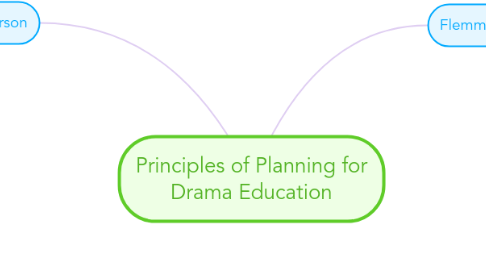
1. Anderson
1.1. Engagement
1.2. Balancing the Curriculum
1.3. Internal Factors
1.4. External Factors
1.5. Planning for the 21st Century
1.6. Outcomes-based Education and Drama
1.6.1. Embodied Learning
1.6.2. Planning for Creativity
1.6.3. Planning for Multiliteracies
1.6.4. Planning for Empathic Decision Making and Action
1.6.5. Planning for Democratic Understanding
1.7. Principles for Effective Planning in Drama Learning
1.7.1. Plan for a Living Experience of Drama
1.7.2. Emergent Learning
1.7.3. Encouraging Divergent, Connected and Deep Learning - drama has the potential to be the productive pedagogy (Anderson, 2012)
1.7.4. Planning for Social Learning
2. Flemming
2.1. Effective Planning
2.2. Learning in Drama or Learning Through Drama?
2.3. Choosing and Idea That Works
2.4. Recognizing Objectives
2.4.1. Can give focus and direction to teaching but often written in vague terms.
2.4.2. Expressing objectives as a question to get closer to learning outcomes and is less prescriptive.
2.4.3. Seen more as the development of ability in drama.
2.5. Planning Schemes of Work
2.5.1. Thematic Approach
2.5.2. Purely Text-Based Approach
2.5.3. Projects
2.6. Emphasis on Narrative Rather Than Plot
2.6.1. Failure to Engage Pupils with the Comtent
2.7. Pitfalls
2.7.1. Failure to Plan Questions and Discussions
2.7.2. Failure to Plan to Support Group Work
2.8. The Available Space
2.8.1. One of drama's essential distinguishing factors as an art form is that it takes place in real space and time (Flemming, 2011).
